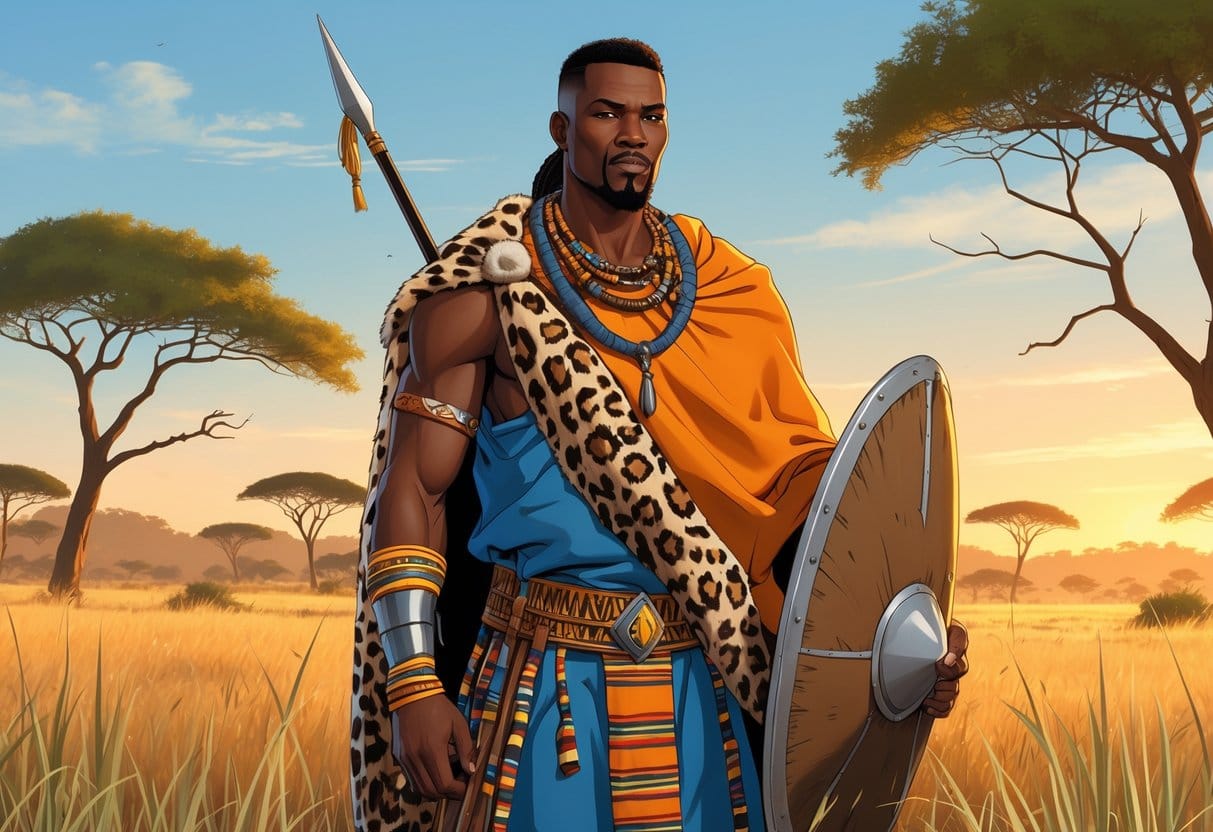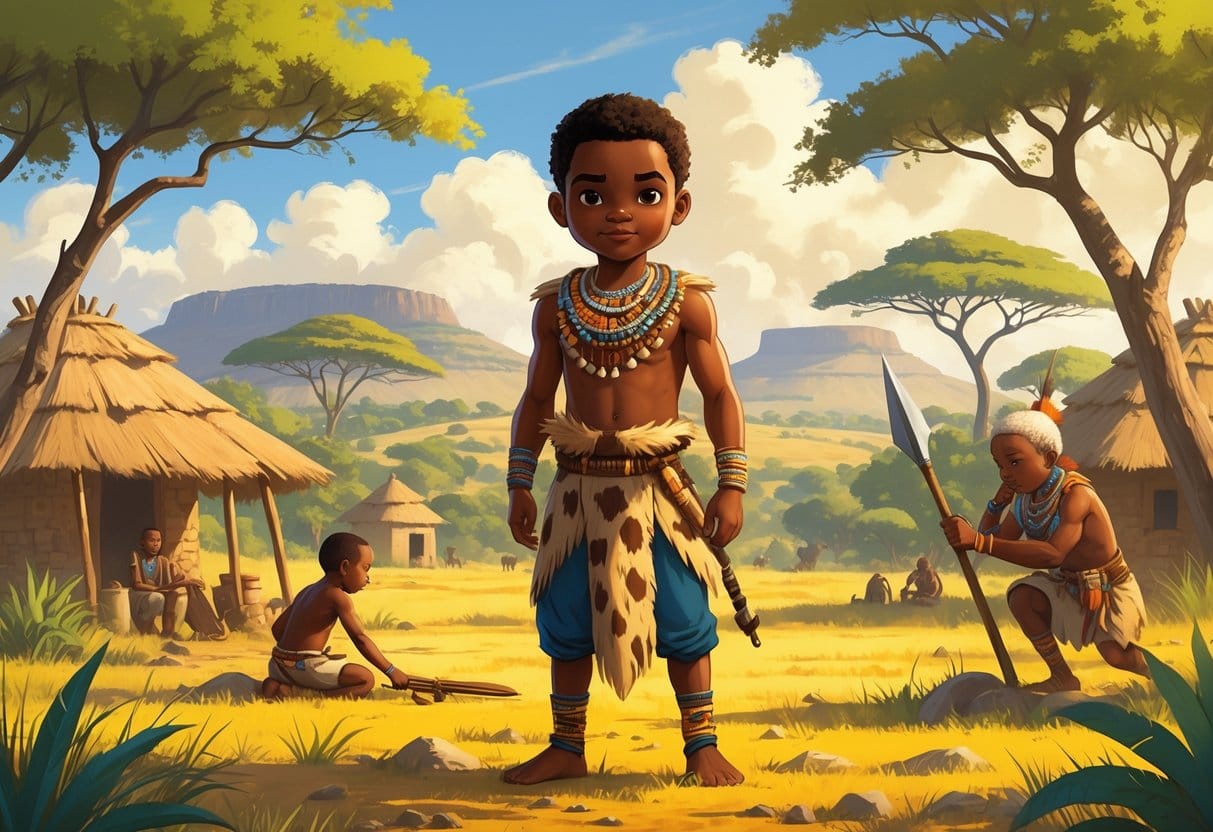Shaka Zulu was a powerful leader who changed the history of Southern Africa. He was the king who built the Zulu Empire and made it one of the strongest kingdoms in the region through his military skill and leadership.
His impact still shapes the area’s history today.

You’ll get a look at how Shaka grew up, how he rose to power, and why he’s remembered as a great warrior and ruler. Understanding his story helps explain the beginning of many traditions and conflicts in Southern Africa.
This guide dives into what made his rule important and how people today view his actions and influence.
Key Takeaways
- Shaka built a powerful empire through strong leadership and military skill.
- His early life and rise shaped the way he ruled the Zulu people.
- His legacy continues to affect Southern African history today.
Early Life and Background

Let’s start with Shaka’s family roots, his early environment, and the people and events that shaped his childhood. These things set him up to become a key leader of the Zulu people in southern Africa.
Birth and Family Origins
Shaka was born around 1787 in what’s now KwaZulu-Natal, South Africa. His father was Senzangakhona, chief of a small Zulu clan.
His mother, Nandi, came from the Langeni people. Shaka’s birth was considered illegitimate because his parents weren’t married.
This status affected his early life and how others saw him. Still, his connection to leadership and the Zulu royal family was obvious from the start.
Culture and Upbringing
Growing up with the Zulu people, Shaka learned their customs and way of life. The Zulu were a small community, but they had deep traditions around family, loyalty, and warrior skills.
Young boys were trained in hunting and fighting—skills you just had to have for survival and protection. Shaka’s youth was shaped by this culture of strength and respect for leadership.
Early Influences
Shaka’s early years were tough because of his mother’s status and clan rivalries. These hardships probably influenced his view on power and loyalty.
He also had strong role models in his family. All those experiences with both conflict and guidance helped him become a disciplined and focused leader later in life.
Rise to Power
Shaka’s rise was shaped by key relationships, military skill, and conflicts with rival groups. His leadership transformed the Zulu into a strong state.
Alliance With Dingiswayo
Dingiswayo led the Mthethwa, a powerful northern Nguni group. Shaka’s early alliance with Dingiswayo was a game-changer—Dingiswayo supported and mentored him.
This alliance gave Shaka access to military training and weapons. Dingiswayo helped him gain followers and provided political backing.
When Dingiswayo died, Shaka took advantage of the weakened leadership to step up. That alliance really set the stage for Shaka’s rise as a dominant leader.
Leadership Over the Zulu State
As leader of the Zulu nation, Shaka reorganized the state with strict military discipline. He introduced new weapons like the short stabbing spear and pushed close combat tactics.
The Zulu army grew into a powerful force under his command. Shaka grouped warriors into age-based regiments, or “impis,” which made training and coordination a lot better.
His leadership united many clans under the Zulu banner. Those reforms made the Zulu state expand quickly across southern Africa.
Conflict With the Ndwandwe
Shaka faced serious threats from the Ndwandwe, a rival kingdom to the northeast. Their conflict was central to Shaka’s rise.
Shaka’s forces defeated the Ndwandwe king, Zwide. That victory weakened a major rival and let the Zulu state grow.
The battle affected nearby groups like the Swazi too. After the Ndwandwe’s defeat, the Swazi carved out their own territory in what’s now Swaziland.
Shaka Zulu’s Legacy and Transformations
Shaka Zulu changed the Zulu Kingdom in ways that lasted long after his rule. He improved how armies fought and restructured how the Zulu people lived and fought.
Military Innovations and Strategies
Shaka used new ideas to make his army stronger. He created the iklwa, a short stabbing spear that replaced the long throwing spear.
This let his warriors fight closer and more effectively. Shaka also introduced the bull horn formation, where warriors surrounded enemies like a bull’s horns.
That tactic increased surprise and control in combat. He made his soldiers train barefoot to toughen their feet for long marches.
These changes gave the Zulu warriors a real military edge.
Impact of the Mfecane
The Mfecane was a time of chaos and migration across southern Africa. Shaka’s expansion of the Zulu Kingdom caused many smaller groups to move or be destroyed.
Many chiefs resisted Shaka’s power but were often defeated. This forced large movements of people, known as the Mfecane, which totally reshaped the region’s ethnic map.
At the same time, the conflict created new alliances and states. Shaka’s role in this period led to both violence and the rise of a strong Zulu state.
Reforms and Government
Shaka changed the Zulu leadership system to hold power more tightly. He made the king’s authority absolute and organized his kingdom like a military state.
He replaced loose alliances with direct control over conquered areas. Shaka used a system of age regiments, where men of similar ages formed units that also worked as social groups.
This helped unify the kingdom. The reforms made the Zulu more disciplined and loyal to Shaka and his successors.
Zulu Warriors and Society
The Zulu warriors, or amazi, became the core of Shaka’s kingdom. His army wasn’t just about fighting—it shaped Zulu culture.
Warriors lived in military camps and followed strict rules. They trained daily and had to prove their strength and courage.
This lifestyle made warrior status a key part of society. It also created a strong identity for the Zulu people, built around loyalty, bravery, and unity.
Death, Influence, and Modern Historiography
Shaka Zulu’s death marked a major turning point for the Zulu nation. How he died, the way historians view his actions, and his lasting role as an African leader are all key to understanding his impact on history.
Circumstances of Assassination
Shaka was assassinated in 1828 by his own half-brothers, Dingane and Mhlangana. They acted because Shaka’s strict rule and harsh punishments caused unrest among his people and court.
His policies and behavior, especially after the death of his mother, made him unpredictable and feared. The assassination ended Shaka’s control and led to Dingane taking power as king.
This event saved the Zulu kingdom from possible collapse under Shaka’s worsening rule. The method of his assassination reflects the Zulu royal family’s internal conflicts and the violent nature of leadership struggles in that time.
Historical Interpretations
Historians have debated Shaka’s legacy for decades. Some see him as a brilliant military innovator and powerful leader who united many clans.
Others focus on his cruelty and role in causing suffering during the Mfecane, a time of widespread conflict in southern Africa. Modern historians try to balance these views by using Zulu oral history and written records.
They argue Shaka should be studied both as a strategic African leader and as a ruler whose harsh methods impacted societies deeply. Interpretations depend on the sources used and, honestly, the historian’s own background.
Shaka’s Role in African Leadership
Shaka shook up African leadership by turning the Zulu from a minor chiefdom into a powerful kingdom. He brought in fresh military tactics and managed to unite a bunch of different groups under one banner.
His leadership was a mix of strict control and clever strategies. Some folks see him as a unifier, while others point out he used fear to hang onto power.
Shaka’s influence lingers in how later African leaders handled politics and war. He also left his mark on Zulu religion and the social order, making him way more than just a military guy.
| Aspect | Description |
|---|---|
| Leadership Style | Strict, strategic, sometimes harsh |
| Military Innovations | New weapons use, disciplined regiments |
| Influence on Society | Changed social structures, Zulu religion impact |
| Legacy | Mixed views: hero and tyrant |